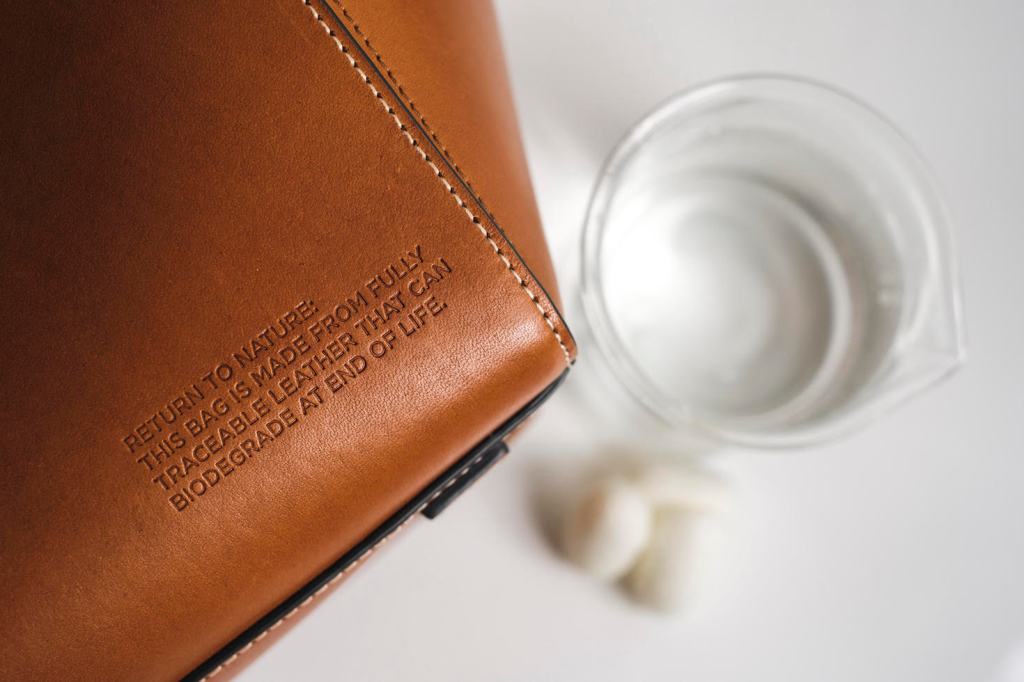Can silkworms take a bite out of petrochemicals?
Evolved By Nature recently raised $120 million to cultivate technology that uses natural silk protein to replace certain petrochemical ingredients in skincare and leather products. Read More

The Activated Silk solution can be sprayed onto leather to create a protective coating that repels moisture
The buzz about petrochemicals in skincare products is not exactly a mainstream meme, but the evidence is plain to see. Vaseline’s label trumpets its status as 100 percent petroleum jelly, but any non “clean” product soaked with mineral oil (hydration), polyethylene (penetration), sodium laureth sulfate (for cleansing), isopropyl alcohol (disinfecting) or benzene (scent) is also culpable. Heck, even aspirin as we know it today was discovered during experiments with coal tar. Bet you didn’t know that. I didn’t.
So, even as the world transitions to cleaner energy sources, the economy’s reliance on chemicals refined from crude oil, coal and natural gas continues to grow. One research forecast predicts related revenue will top $888 billion in 2028, up dramatically from about $372 billion in 2020. The oil majors have an interest in seeing that number rise to preserve their value. Consider that about 30 percent of ExxonMobil’s earnings in 2021 came from petrochemicals, up substantially from 2020. (2020 is a tough year for comparisons, for obvious reasons, but that percentage is still nothing to sneeze at.)
That addiction to petrochemicals is something climate tech materials startup Evolved By Nature seeks to address, with the help of mulberry leaf-munching silkworms. The firm is developing its Activated Silk technology as a replacement for certain petrochemical ingredients, starting with skincare products and protective coatings for leather and other textiles. Making the switch has both a climate impact, reducing a reliance on fossil fuels, and a human health benefit, helping eliminate ingredients that are known endocrine disruptors. “The world needs medicines and materials that meet the challenges of today without imposing consequences on tomorrow,” Greg Altman, co-founder and CEO, told me last week.
In late June, the Boston-area company disclosed $120 million in Series C funding, led by the venture group of the Ontario Teachers’ Pension Plan Board along with Senator Investment Group, a New York hedge fund. The infusion brings the company’s total backing to $211 million; previous investors include the likes of Jeff Vinik (minority owner of the Boston Red Sox), Roy Disney (yes, that Disney family) and Emerald Development Managers (an early-stage venture fund in New York).

The Activated Silk tablets are delivered as concentrated tablets that can be diluted with water. Photo courtesy of Evolved By Nature
At the heart of Evolved By Nature’s biotechnology is natural silk protein, which the company turns into bioactive molecules that can be used to apply protective barriers to skin — of all types. Altman said the company has created concentrated tablets that can be diluted with water. The solution, marketed under the Activated Silk brand, is then sprayed onto leather to create a protective coating that repels moisture, replacing the need for the thin polyurethane films that are used for this purpose today. By delivering its products in tablet form to customers, the company cuts down on the emissions impact of the water weight.
The Evolved By Nature coating is ultimately biodegradable, making it simpler to reclaim and reuse the material. “When you are done using it, it can go back into the earth’s circular economy,” Altman said. Evolved By Nature is already working with fashion brands including Anya Hindmarch, leather tanneries such as Richard Hoffmans and nylon mills Alpine Creations and Apex Holdings on the application described above.
The approach is slightly different for skincare products. In those applications, Activated Silk could be used to deliver and lock in moisture, as it already does with its own brand of hand soap. While Altman was not at liberty to discuss customers, Evolved By Nature is working with a large consumer packaged goods company on personal care products that should be on shelves in the CVS retail drug store chain later this year.
The money from the Series C round will help the company grow its manufacturing capacity in Walpole, Massachusetts, from 150 metric tons of Activated Silk to 900 metric tons per year in 2024. For perspective, the company said that translates into the production of “900 million jars of petrochemical-free skincare, 150 million square feet of biodegradable, polyurethane-free leather, sustainable finish chemistry for 195 million pieces of performance apparel or a replacement for 7,200 metric tons of non-biodegradable petrochemical surfactants” from skin cleansing products.
“Evolved By Nature has a compelling vision to break through new scientific boundaries to reduce our reliance on problematic chemicals and build better, more sustainable supply chains in the process,” said Olivia Steedman, senior managing director of Teachers’ Venture Growth, in a statement. “We’re delighted to partner with them in executing this vision and growing their operations globally.”
Evolved By Nature plans to almost double its workforce to about 150 people over the next 18 months. There’s also another potential upside to its development plan that goes beyond its own workforce: The company hopes to create opportunities for wider use of sericulture — the practice of raising mulberry trees, which silkworms eat to produce silk. The trees also help prevent soil erosion, and the berries are a source of protein, making them a potential new form of revenue for agronomists and farmers seeking to use their land for different crops. Mulberry trees, for example, enjoy the same conditions as vineyards.
While the company expects to focus on U.S. manufacturing capabilities, it anticipates cultivating relationships with farmers in China, Italy, Africa and Colombia, according to Altman. What’s more, he insists that using Activated Silk as a replacement isn’t disruptive to established production processes, which makes it fairly simple to embrace this substitute. “The most important point to make is that change is feasible now… The change is happening as we speak,” Altman said.













